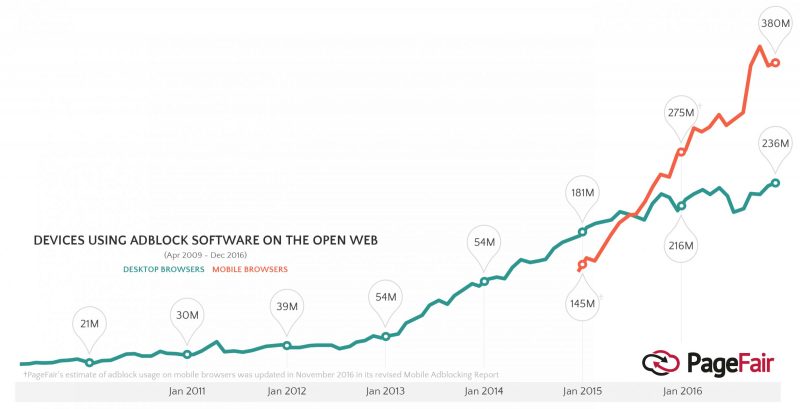Google is reportedly working in its own adblocker for Chrome, cutting out services like Adblock Plus.
On the surface, this doesn’t make sense.
Google makes most of its money from online advertising, so why block them?
It doesn’t have any choice.
Embarrassingly, Google paid Adblock Plus, one of the most popular adblockers out there, a loosely rumoured $25 million (£19.5 million) to allow its own ads through.
And while its Chrome browser is massively popular, there's stiff competition from Asian browsers which have in-built adblockers. If Google wants Chrome to stay on top in Asia, it has to keep up.
To understand how Google has got to this point, you need to delve into the history and politics of adblocking.
If you have an adblocker installed, you probably use something like Adblock Plus or Adblock. There are now 615 million devices blocking ads globally, according to PageFair.

Adblock Plus doesn't actually block all ads, but charges companies like Google to allow some ads through, a process called "whitelisting". It does this to make money.
Google is actually kind of embarrassed about doing this, because it means losing control over part of its advertising business. Circumventing third-party adblockers with a Chrome adblocker is one way to regain that control.
The ad industry hate this concept of paid whitelisting, and publishers have described it as "blackmail." But they do accept that ads need to get better if people are to stop blocking them.
Think about why you block ads. It's probably because they can be annoying, interruptive, use up mobile data, and play sound automatically. The entire ad industry is aware of this, and formed something called the Coalition for Better Ads to try and make advertising better. (Unfortunately for avid adblocker users, it's not trying to end advertising altogether.)
The coalition has already banned some types of ad which lead to a poor user experience - like videos which autoplay with sound, and pop-ups. So far, it doesn't seem to have made any rules about ad trackers for privacy-conscious adblocker users.
Google, Facebook, and representatives of the biggest publishers all sit on the Coalition for Better Ads. So we can assume that all of their advertising will comply, or eventually comply, with the coalition's standards.
In practice then, Google's adblocker won't block advertising from anyone who meets these standards, and that avoids the paid whitelisting problem.
That means you'll still see ads from the biggest sites you visit today, they'll just look better and load faster. What will stop is pop-ups, pop under ads which hide under your browser window, and other annoying ads which mostly appear on poor quality sites.
To be clear, services like Adblock Plus were moving in this direction anyway - Google just wants to get ahead of the game. Adblock Plus has formed its own "Acceptable Ads" committee, but hasn't got much of the industry on board.
"I'm surprised it's taken them so long to take advantage of market share Chrome has got, rather than letting other tech companies come in and occupy this space in the market," Paul Mead, chairman of media agency VCCP Media told Business Insider. "Google is all about controlling access to the ecosystem, and anybody else [getting] a foot in the door is a bit of a missed trick."
The Coalition for Better Ads shows that Google has been in discussions with the ad industry for a while about improving ads but, according to Mead, actually building an adblocker will enforce better standards faster.
"Google thinks the rest of industry is moving too slowly, and feels it's addicted to the short-term revenue kick that bad ad experiences deliver, and this is one way it can force [better standards]," he said.
Paul Lomax, the chief technology officer at magazine publisher Dennis, predicted that Google would move into adblocking last year.
He pointed to Asian services like UC Browser, which comes with an in-built adblocker and is the top mobile browser in India, according to StatCounter.
"You see browsers with in-built adblockers that have 80% market share," he told Business Insider. "If you're Google, you don't want to lose out to competitive browsers that have adblocking by default."
For Lomax, the Chrome adblocker would be a positive move. "We as premium publishers can benefit if we can eradicate terrible experiences on the web," he said. "I'm hoping it's a good thing."

